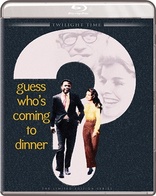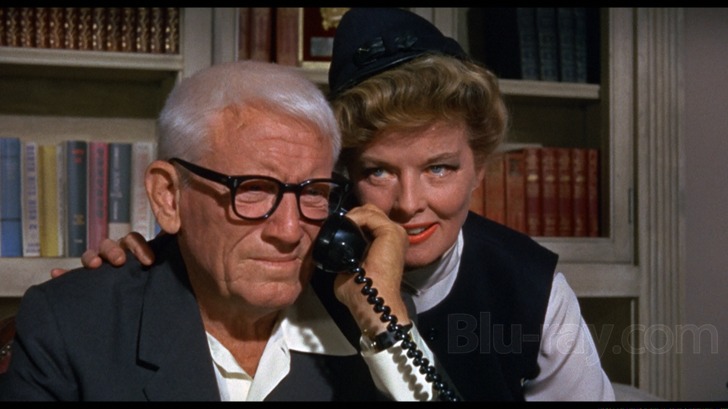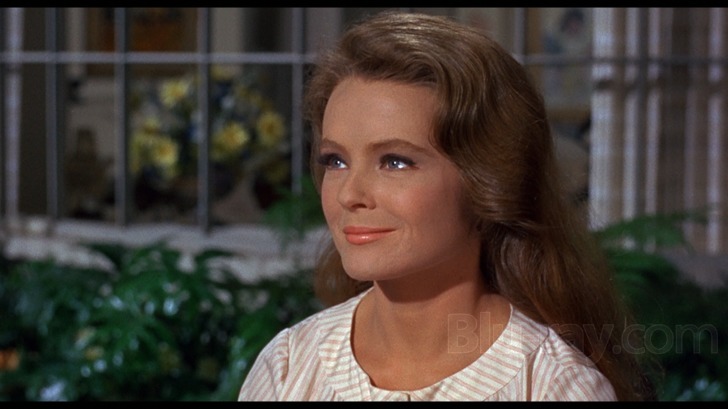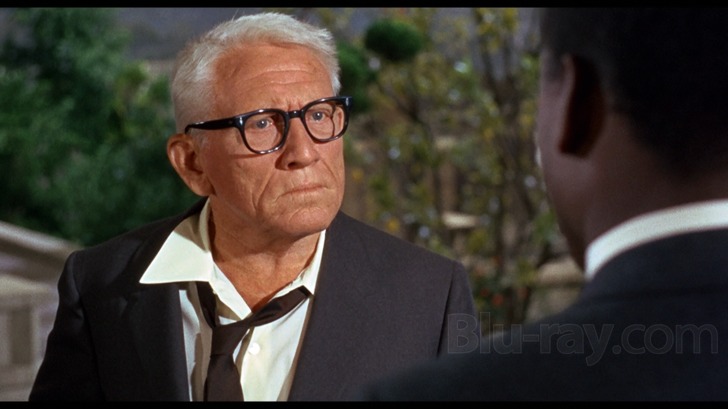Guess Who's Coming to Dinner Blu-ray Movie
HomeGuess Who's Coming to Dinner Blu-ray Movie 
Limited Edition to 3000 - SOLD OUTTwilight Time | 1967 | 108 min | Not rated | Aug 11, 2015

Movie rating
7.6 | / 10 |
Blu-ray rating
| Users | 5.0 | |
| Reviewer | 4.5 | |
| Overall | 4.5 |
Overview
Guess Who's Coming to Dinner (1967)
Matt and Christina Drayton are a couple whose attitudes are challenged when their daughter brings home a fiancé who is Black.
Starring: Spencer Tracy, Sidney Poitier, Katharine Hepburn, Katharine Houghton, Cecil KellawayDirector: Stanley Kramer
| Drama | 100% |
| Romance | 98% |
| Comedy | Insignificant |
Specifications
Video
Video codec: MPEG-4 AVC
Video resolution: 1080p
Aspect ratio: 1.85:1
Original aspect ratio: 1.85:1
Audio
English: DTS-HD Master Audio 2.0 (48kHz, 24-bit)
Music: DTS-HD Master Audio 2.0 (48kHz, 24-bit)
Subtitles
English SDH
Discs
50GB Blu-ray Disc
Single disc (1 BD)
Playback
Region free
Review
Rating summary
| Movie | 4.5 | |
| Video | 5.0 | |
| Audio | 4.0 | |
| Extras | 4.0 | |
| Overall | 4.5 |
Guess Who's Coming to Dinner Blu-ray Movie Review
Reviewed by Jeffrey Kauffman August 20, 2015While it’s hard not to see a number of racially charged events that have made front page news over the past few years as signs that we’ve not come all that far in terms of understanding and tolerance, revisiting and/or re-viewing Guess Who’s Coming to Dinner? at least makes it clear that some aspects of race relations have improved, however incrementally, since the mid to late sixties. When Stanley Kramer’s film was released in 1967, it was still illegal in several states for races to intermarry (“miscegenation” was the preferred term back then). The Civil Rights Era was in full flower in 1967, having been sparked by the landmark Civil Rights Act passed a couple of years prior to the film, not to mention the already iconic efforts of such legends as Dr. Martin Luther King, Jr. and Rosa Parks. While there were obviously huge strides being made in a number of arenas, things were still in transition, and it was one of screenwriter William Rose’s smartest decisions to place the film within the confines of what would normally be seen as a fairly liberal, progressive leaning household in that most left leaning of west coast cities, San Francisco. Rose’s barely concealed subtext seemed to be something along the lines of, “See? Even the most ‘fair minded’ sort of person might be given pause when confronted by the possibility of an interracial marriage in their own family.” Kramer, a famously left leaning sort himself, toes a rather fine line in Guess Who’s Coming to Dinner?, offering potentially provocative material in a somewhat elided manner that was apparently crafted to push the envelope only so far, as if Kramer instinctively knew that in order for the film’s message to fully resonate, he needed to make sure things didn’t play like some sort of screed yelled at an imposing decibel level. The film is surprisingly low key a lot of the time, even when discussing some pretty touchy material, and it offers a coterie of incredibly fine performances from Spencer Tracy (who died shortly after completing his duties), Katharine Hepburn (who won an Oscar for her role), and of course Sidney Poitier, whose so-called annus mirabilis of 1967 also included stellar turns in To Sir, With Love and In the Heat of the Night.

Some may consider it willful misdirection when Guess Who’s Coming to Dinner introduces its focal mixed race couple, John Prentice (Sidney Poitier) and Joey Drayton (Katharine Houghton), underneath a credits sequence. The two are seen departing from a flight, though it’s notable that it’s not completely clear just how linked the two are until they climb into a cab together and then are spied catching a kiss by the taxi driver looking up into the rear view mirror. The “distance” here between the “shocking” (for 1967) subject at hand and its presentation is something that may strike younger viewers watching for the first time as impossibly quaint.
The couple stops by an art gallery for a moment, which is when the first hints of societal disapproval begin to be seen, courtesy of gallery employee and Drayton family friend Hilary St. George (Virginia Christine). It turns out Joey’s return to the City by the Bay is a bit unexpected, and along with its lack of a pre-announcement is even more surprising (even stupefying) news: Joey is engaged to John.
Rose and Kramer start to dole out little vignettes of reaction even before Joey’s parents Matt (Spencer Tracy) and Christina (Katharine Hepburn) enter the fray, courtesy of Drayton maid and housekeeper Tillie (Isabel Sanford). Though there’s not a lot of dialogue (at least to begin with) between Tillie and John, it’s more than apparent that this hard working older black woman is completely at odds with seeing Joey with a black man, or perhaps to state it with more psychological accuracy, a black man with Joey. While the situation with Joey’s parents ultimately takes center stage, the social critique with regard to Tille and John is in some ways even more remarkable for a 1967 film. (It’s no small irony that Sanford would become best known as Louise Jefferson on All in the Family and The Jeffersons, playing the sort of upwardly mobile African American character who would probably rub Tillie the wrong way from the get go.)
While the foundational elements of Guess Who’s Coming to Dinner, the very elements which made the film such a cause célèbre upon its initial release, don’t pack quite the wallop they once did, the film still is absolutely revelatory in some of its supposedly tangential aspects. The wonderful disconnect between the Drayton parental units' lifelong championing of liberal causes (note the picture of Franklin Delano Roosevelt adorning the library desk) and their “real world” response to the situation at hand is well detailed (though Hepburn spends a lot of this film with overly dewy eyes), and a rather heartfelt subplot involving a family friend who’s also a priest (Cecil Kellaway) is surprisingly tart. Also potent is the extremely well handled and energetic Tillie angle, especially in a couple of knockout scenes where Sanford gets to strut her stuff. There’s also a rather interesting showdown between John and his Dad (Roy E. Glenn) which puts a fascinating generational spin on the (then) still nascent Civil Rights movement that may squarely place the film as a product of its time, but which tends to resonate in some unexpected ways nonetheless.
Hepburn may have brought home the Oscar for Guess Who’s Coming to Dinner, but it’s at least arguable that the film really belongs to Tracy. The actor, who was evidently much more ill than even some of his fellow cast members may have realized, brings both his customary taciturn nature as well as some beautifully nuanced emotion to his portrayal of a liberal bastion who’s suddenly forced to take a close look at what amounts to his own ironic “do as I do, not as I say” ethos. Poitier is calm and measured in a largely thankless role, and Houghton is fine if a bit unremarkable as a somewhat underwritten character, one that relies mostly on the “gimmick” of the plot rather than any real histrionics to create any impact. Kramer, a man who never shied away from delivering “messages,” keeps things surprisingly light in spite of the potentially contentious material, and this is one Dinner most people will want to RSVP to affirmatively.
Guess Who's Coming to Dinner Blu-ray Movie, Video Quality 

Guess Who's Coming to Dinner is presented on Blu-ray with an AVC encoded 1080p transfer in 1.85:1. Reportedly culled from a new 4K scan supervised by Grover Crisp's typically commendable team at Sony-Columbia, this transfer boasts a wonderfully organic appearance, with a naturally resolving fine grain field offering appropriate texture throughout the presentation. Aside from some intentionally filtered shots (mostly of Hepburn in close-up), the transfer boasts excellent sharpness and clarity. While the palette looks accurate and in fact rather warm at times, I personally would have preferred a bit more heft to the saturation, as to my eyes elements like flesh tones can look just slightly pasty at times. The increased resolution tends to belie some of the more theatrical aspects of the production design, like the supposed backdrop of San Francisco beyond the luxe veranda at the Draytons' palatial home, one which looks obviously painted.
Guess Who's Coming to Dinner Blu-ray Movie, Audio Quality 

Guess Who's Coming to Dinner's unshowy but serviceable DTS-HD Master Audio Mono track capably supports the film's long, expository dialogue sequences, as well as Frank De Vol's rather lush score (one which interpolated the 1930s hit "The Glory of Love," making it a hit all over again). Fidelity is fine and the track, while narrow, has no problems of any kind to address.
Guess Who's Coming to Dinner Blu-ray Movie, Special Features and Extras 

- Isolated Score Track is presented in DTS-HD Master Audio 2.0.
- Audio Commentary features Eddy Friedfeld, Lee Pfeiffer and Paul Scrabo.
- Introductions offer brief but rather interesting comments from a host of different folks:
- Karen Kramer (1080i; 2:44)
- Steven Spielberg (1080i; 1:07)
- Tom Brokaw (1080i; 2:46)
- Quincy Jones (1080i; 2:50)
- A Love Story for Today (1080i; 29:53) is a really well done retrospective with both production information and some brief biographical data on various participants.
- A Special Kind of Love (1080i; 17:15) includes some really interesting archival recordings of Hepburn, along with an interview with Houghton (who does a killer Hepburn impersonation) discussing what it was like to be Hepburn's niece.
- Stanley Kramer: A Man's Search for Truth (1080i; 16:57) is a good generalist overview of Kramer's vision, including some nice archival comments from the auteur himself.
- Stanley Kramer Accepts the Irving Thalberg Award (1080i; 2:01)
- 2007 Producers Guild Stanley Kramer Award Presentation to An Inconvenient Truth (1080i; 4:37)
- Original Theatrical Trailer (1080p; 2:37)
- Teaser (1080p; 1:04)
Guess Who's Coming to Dinner Blu-ray Movie, Overall Score and Recommendation 

Parts of Guess Who's Coming to Dinner were decidedly old fashioned even in 1967-68, when the film initially unspooled across the nation, though that perhaps was part of the "grand design" of both William Rose and Stanley Kramer. By couching such provocative material in such a comfortable setting, the two were able to examine a whole host of social issues then roiling the American psyche. While younger viewers especially will probably wonder what all the fuss was about, either in terms of interracial marriage itself or indeed of this particular film, there are still a number of supposedly tangential elements to the central plot that continue to poke and prod at various aspects of America's (and indeed the world's) dialectic with race relations. This new Blu-ray offers top notch video and excellent audio, along with some very appealing supplements, and it comes Highly recommended.
Other editions
Guess Who's Coming to Dinner: Other Editions
Similar titles
Similar titles you might also like

The Landlord
1970

His Girl Friday
+ 1931 The Front Page
1940

Amira & Sam
2015

Love with the Proper Stranger
1963

Breakfast at Tiffany's
1961

Giant 4K
1956

Wild River
Fox Studio Classics
1960

Darling
1965

Rachel, Rachel
Warner Archive Collection
1968

The Kite Runner
2007

Looking: The Movie
2016

Imitation of Life
1934

Shampoo
1975

Sense and Sensibility
Limited Edition to 3000 - SOLD OUT
1995

Mrs. Miniver
1942

Imitation of Life
1959

Moonstruck
1987

God's Little Acre
1958

The Only Game in Town
Limited Edition to 3000 - SOLD OUT
1970

The Quiet Man
1952

